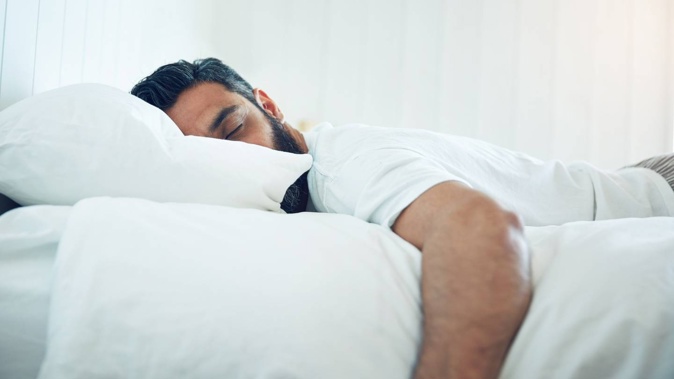

A jury has cleared a man of sexually assaulting his partner’s teenage daughter by reason of insanity because he was suffering from “sexsomnia”.
A judge has also ruled the Hamilton man can now walk free, deeming him to have enough “wherewithal” to monitor his triggers of the disorder, which include night shift sleep deprivation, depression and anxiety.
The man, aged in his 30s who was granted permanent name suppression, is the second case within a month in which sexsomnia, a sleep disorder in which a person engages in sexual activity during their sleep, has been used as a defence.
In the Hamilton case, jurors found the man not guilty by reason of insanity on charges of sexual conduct with a young person under 16, and sexual violation by unlawful sexual connection.
However, they were unable to reach a verdict on two charges of indecent assault. All the incidents occurred between January 2018 and July 31, 2020.
Judge Noel Cocurullo said the verdicts didn’t surprise him and that the accused had no convictions “for anything like this”.
“Your defence, which the jury accepted was a positive defence, that whilst you had done the acts constituting both of those charges, you were not aware that you had done the acts.
“They were involuntary actions by you because the jury, by their verdict, were satisfied to the requisite standard that you were asleep.
“As unusual as that sounds, the law provides for this situation.”
Judge Cocurullo said he knew his decision could cause some “angst”, but Parliament had the provision in its own legislation and intended it to be an option.
University of Auckland law professor Carrie Leonetti, who lectures forensic psychiatry, told NZME sexsomnia is quite a rare form of “automatism” - the legal term for unconscious actions - compared to other parasomnias such as sleepwalking, night terrors and restless leg syndrome.
Like insanity, automatism is what is known as an “excuse” defence - meaning that, when proven, a defendant is excused from what would otherwise be deemed criminal conduct, explained Leonetti.
There are two types of legal categorisations for automatism: sane and insane.
While the line between the two can at times be murky, cases involving claims of sexsomnia often fall under the category of insane automatism.
The man’s sentencing had been adjourned several times for the Crown to seek expert advice on how to deal with the matter.
Prosecutor Rebecca Guthrie said the Crown sought a second expert opinion after the first psychiatrist said there wouldn’t be any treatment available for the man’s condition.
The second expert said if there was to be any monitoring, it should be done by a sleep specialist in conjunction with a psychiatrist.
Judge Cocurullo said his options were to either order him a patient under mental health legislation or let him go.
Guthrie said it was a matter for the judge, while defence counsel Martin Dillon said it was more appropriate for his client to be freed.
Dillon said the second psychiatrist found the risk of reoccurrence was low so long as the accused’s triggers were managed.
“He does speak of treatment but he’s not speaking of treatment of the condition of sexsomnia ... sexsomnia itself isn’t amenable to direct treatment but it can be managed by removing certain triggers from a patient’s environment.”
Judge Cocurullo ultimately found the accused was aware he had “this somewhat unusual diagnosis” and he had given “cogent and credible evidence” to the jury.
“I take the view that you are well aware that it is utterly a risk if you fall asleep with anyone other than your intimate partner and that is to be avoided at all costs, particularly with young people.
“I take it that you are aware of your general health, as opposed to the triggers for sexsomnia. I take it that you are aware of night shift sleep deprivation, depression, anxiety and things of that basis.”
The Crown decided not to pursue a new trial over the two unresolved charges and, at his sentencing last week, Judge Cocurullo ruled the man could be “immediately released” under section 25 of the Criminal Procedure (Mentally Impaired Persons) Act 2003.
The judge’s ruling means the man is now free.
The charges where the jury was hung related to the man regularly slapping the complainant on the bottom while walking around the house and poking and playing with her breasts.
The other more serious offending which he was cleared of due to sexsomnia involved allegations he got into the complainant’s bed after he finished work. He was allegedly talking inappropriately, cuddling, trying to kiss the girl and hold her breasts and sexually assaulting her.
DO YOU HAVE A JUSTICE STORY WE SHOULD BE COVERING?
In a separate case, Taine Wanoa recently pleaded guilty to rape and inappropriately touching four women over the course of two years. It was stated in an agreed summary of facts that he was suffering sexomnia during two of the incidents. The 25-year-old will be sentenced later this year.
The two cases aren’t the only ones where sexsomnia has been cited. In April, a married father convicted of indecently assaulting a woman at a party had his conviction overturned after successfully arguing the sexsomnia defence.
In May, Rotorua resident Tony Paraire Cameron had an appeal rejected after he was sentenced to seven years and eight months’ imprisonment for raping a 15-year-old girl at a party.
Cameron did not deny he had sex with the teen but claimed he was either too intoxicated to form the required intent or that he committed the offence while he was asleep because of sexsomnia.
What is sexomnia?
The term sexsomnia was coined in 2003 and has since been recognised in the Diagnostic and Statistical Manual of Mental Disorders (DSM-5)10 and the International Classification of Sleep Disorders.
Although still quite rare, criminal cases in New Zealand involving claims of sexsomnia date back more than a decade. But until now, the defence strategy has been more of an all-or-nothing gambit — either the condition was accepted by the judge or jury, resulting in acquittal, or it was rejected and the defendant went on to be convicted.
Additional reporting: Craig Kapitan
Belinda Feek is an Open Justice reporter based in Waikato. She has worked at NZME for eight years and been a journalist for 19.

Take your Radio, Podcasts and Music with you









